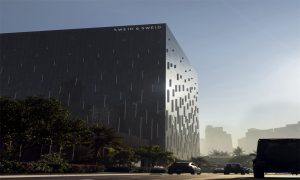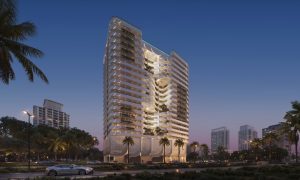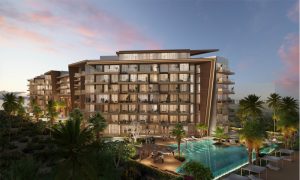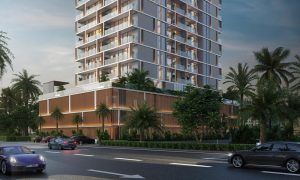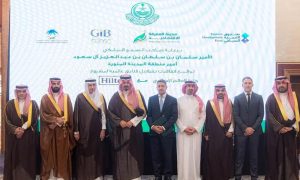Heavy Hitters: Raad Abduljawad
Raad Abduljawad, managing director, Saudi Diesel talks to CMME about the booming Saudi market and guiding one of the world’s biggest dealers

Raad Abduljawad, managing director, Saudi Diesel talks to CMME about the booming Saudi market and guiding one of the world’s biggest dealers.
It’s late February in Dammam. While the heat of summer is still months away, the 200 people out in force for Saudi Diesel’s open day are having to guzzle bottled water to keep cool. Close to its headquarters in Al-Khobar, a crew of orange, roaring Doosan loaders and excavators, some strapping green Montabert crusher buckets and breakers are making a terrible mess of a makeshift construction site.
Loud and dusty, it’s not a day for those with sensitive hearing.
Considering his position as one of the most important men in one of the construction machinery industry’s most important markets, Raad Abduljawad, would have been forgiven if he had preferred to stay away from the commotion and watch from the adjacent hospitality marquis. Typically, for a man that used to sneak into his father’s equipment lot as a boy he instead stands with everyone else. Welcoming and polite, he is clearly in his element.
“One of the contractors told me that they are usually the ones that are out in the sun and today we were,” he jokes.
To him his role at the event is to stand with the contractors and “explain whatever you can.”
Very quickly it becomes clear that Abduljawad is like many of us. He’s someone with that innate passion for all things machinery-related.
“When I was a little boy, about 12 or 13 we had a house with a lot right next it. My father has always been into machinery and me and my brother would jump over the wall and go play with the equipment,” he recalls. “We drove my mother crazy!”
His fascination with machinery led him to studying mechanical engineering. With a tinge of regret he says that he was never destined to spend his life living his childhood fantasies. Although he says the urge to use the machinery has never gone away.
“Unfortunately,” he muses. Surely as managing director he has the privilege of being able to hop on board if he so desires? “No, they won’t let me anywhere near these machines!”
He adds: “In this business once you graduate you don’t get to practice. But you do get to question and learn technical things. And it means that you won’t just let things pass by you. You can share ideas sometimes.”
He then chuckles: “I can keep up to date reading your publication. I try to read what I can.”
Saudi Diesel Equipment Company or SDEC was first established in 1978 as part of the Abduljawad Group of Companies. While its main headquarters and manufacturing facility is still in Al-Khobar it has expanded across the country, offering products and services through main branches in Riyadh, Jeddah, Madinah while co-ordinating a network of other sub-dealers networks.
For the first two decades of its existence, under its former name Saudi Diesel Generators it was most identified in the Kingdom as a manufacturer and distributor of power generation equipment and related accessories. However during the 1990s it took the deliberate decision to expand its product portfolio away from temporary power into other areas such as construction, lifting, concrete and rental equipment.
The Dammam event is an opportunity to get some of this kit out in the open. Joining Doosan’s heavy equipment and Montabert are bulldozers from Chinese manufacturer Peng Pu. However it is Doosan’s 30t articulated dump truck attended by a team of excavators that attracts the most attention.
While Abduljawad travels around the Kingdom to visit clients, he says that the majority of his time is spent in the office. Instead he relies on intelligence from the company’s representatives and branches to gauge where the hot spots are in the booming market. While Dammam, Riyadh and Jeddah tend to get the most attention from those outside Saudi, he says they are not the only areas of interest.
“Business is coming out of the secondary cities,” he explains. “As an example, we opened a branch in Madinah six months ago and it has exceeded our expectations. We’ve been surprised by the amount of projects. Now you have to get closer and closer to your customers. This month we are opening a workshop in Jubail. We will also open one in the north in the next few months.”
He continues: “We are always talking to our dealers, sales people, service people, to find out where they are travelling to.”
Operating across vast stretches of a country almost ten times the size of the United Kingdom with half the size of population requires a special set-up when it comes to the sales and service effort.
“Customers often need a quick response and it is the sales manager that is often the point of contact, but all the way up to the management we have to ensure that we’re ready to react. The projects are moving further and further away from the main cities. We’re discovering our technicians are having to go further and further all the time too.”
Abduljawad continues: “Our branches have to keep close to their customers; to find out what projects he won and how and what we can offer to make their lives simpler.”
Saudi Diesel has grown as the market has grown. As a consequence his role has evolved to become less hands on. Enpowering and trusting others in a family-owned organisation is not always easy even when it is practical, but Abduljawad recognises that it has been crucial in the company’s progress to date.
“People in different departments and different branches have autonomy. They make decisions, they have to do that,” he remarks. “My door is always open so if anybody has an issue we can address it immediately. The important thing is they have the authority to solve these problems before they go that far. If they come to you, you have to listen.”
He adds ruefully: “I have accepted my change in role.”
The temptation to start collecting brands in a market that is super-hot like Saudi must be considerable but Abduljawad reflects on a brave decision to let some lines go at the turn of the decade as fundamental to its current standing.
“Three or four years ago we decided to shed some brands and concentrate on the stronger ones that we had such as Doosan of course,” he says looking out to the machines on show. “We decided to get a bigger market share by putting our resources behind Doosan, so we could grow. It is easy to get derailed and do too many things.”
While hindsight reveals it was the right decision, he explains that it was not so straightforward for everyone within the organisation.
“Some departments and sales teams did not find it easy, but the market has grown and we’ve been able to offer support to our customers (in other ways) such as finance, on-site services and long-term service contracts.
When Doosan’s regional director Gaby Rhayem spoke to CMME at the end of 2012, he intimated that Saudi Diesel was a proactive participant when the company organises meetings for its global network of dealers.
Abduljawad explains that those have become opportunities for his company to share ideas on big practice and customer engagement:
“We can learn from each other. We openly share ideas with Doosan distributors.”
During an earlier demonstration, an engineer for the South Korean manufacturer showed CMME around the desert modifications (such as dust filters) on one of the standing wheel loaders. Abduljawad says that the company benefits from being able to give feedback all the way from Al-Ahsa to Seoul.
“These things actually come from experience on site and talking to customers,” he comments. “There is no substitute for experience in the field. Right from the beginning with Doosan, whenever there has been an issue they have always been helpful.
He then jokes: “Whether it’s been July or August, they put up with it.”
One observer told CMME last year that the Saudi market is so busy at the moment, that any company can be successful whether they are well run organisations or not. Bad businesses make good money in the Kingdom.
“That’s very true,” says Abduljawad. “But how long will you last? You can do it while the market is good but the construction market is cyclical. We have to be there in the good and bad times too. Our customers have to believe in us and it is a journey we go on together.”
For the moment Saudi Diesel’s managing director can be content that his company can ride the wave of activity in the Kingdom from a position of strength. With so much changing at a rapid rate, it must be difficult to plan too far ahead. He says the company has been able to predict the shift in the market with an impressive degree of accuracy.
“A few years ago we started to plan for what the market is like today,” he comments. “We look at everything and thought this will be crazy, could it be possible? We took the chance and we were right.”
“Nobody knows when it could turn, but you have to put things on the ground that ensure that if it should slow down then you are in a good position.”
He continues: “Sometimes slowing down is not so bad. It gets rid of the weak and let’s you reflect on what you’ve got.”
Before the interview is wrapped up there is one remaining question that begs to be asked. If there was one machine that the 13 year old boy still inside the heart of one of the world’s biggest dealers could operate, what would it be?
“I used to drive a wheel loader. I think that would have to be the one.”









